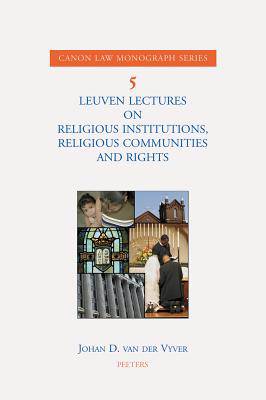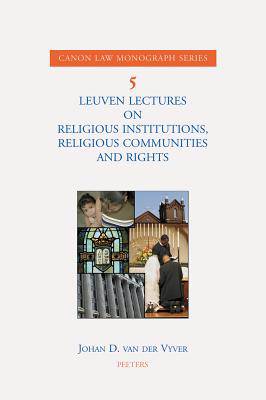
- Afhalen na 1 uur in een winkel met voorraad
- Gratis thuislevering in België vanaf € 30
- Ruim aanbod met 7 miljoen producten
- Afhalen na 1 uur in een winkel met voorraad
- Gratis thuislevering in België vanaf € 30
- Ruim aanbod met 7 miljoen producten
Zoeken
Leuven Lectures on Religious Institutions, Religious Communities and Rights
J Van Der Vyver
€ 40,00
+ 80 punten
Omschrijving
Religious institutions, such as churches, are founded on organizational structures, constitute distinct entities in human society, and in their capacity as juristic persons are the repositories of rights and obligations. In certain jurisdictions the rights vesting in a religious institution include constitutionally protected entitlements, such as the right to privacy, freedom of religion and belief, freedom of expression, freedom of association, and property rights. Religious communities, comprising persons sharing a particular confession of faith, lack an organized structure, do not qualify for legal subjectivity, and can therefore not participate in legal relationships as a distinct juristic entity. Rights associated with a religious community belong to the individual members of the community and can be exercised by those members, either individually or jointly with other members of the group. In international law, religious communities qualify as peoples for purposes of the right to self-determination. The rights belonging to religious institutions and religious communities to a large extent fall within the general enclave of economic, social and cultural rights. Economic and social rights have been singled out as a distinct category of constitutionally protected human rights in the early twentieth century and ultimately find their base in the encyclical Rerum Novarum (1891) of Pope Leo XIII. The Leuven Lectures, focused upon the above, seek to uncover the protection of the rights of religious institutions and religious communities in international law and in the constitutions of a cross-section of the international community of states.
Specificaties
Betrokkenen
- Auteur(s):
- Uitgeverij:
Inhoud
- Aantal bladzijden:
- 119
- Taal:
- Engels
- Reeks:
- Reeksnummer:
- nr. 5
Eigenschappen
- Productcode (EAN):
- 9789042914971
- Verschijningsdatum:
- 30/05/2005
- Uitvoering:
- Paperback
- Formaat:
- Trade paperback (VS)
- Afmetingen:
- 162 mm x 243 mm
- Gewicht:
- 231 g

Alleen bij Standaard Boekhandel
+ 80 punten op je klantenkaart van Standaard Boekhandel
Beoordelingen
We publiceren alleen reviews die voldoen aan de voorwaarden voor reviews. Bekijk onze voorwaarden voor reviews.











